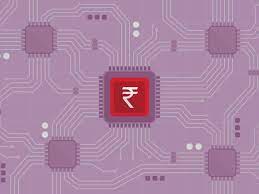Digital Rupee for retail, denoted by e₹-R, will be introduced as part of a pilot by the Reserve Bank of India (RBI) on December 1. This comes a month after the regulatory body launched the Digital Rupee for wholesale (e₹-W) in India on November 1. The newly launched e₹-R and the e₹-W are two variants of India’s own central bank digital currency (CBDC). For those unaware, a CBDC is a digital coin issued by a nation’s central bank — RBI in this case — and carries the same value as its fiat counterpart. Unlike cryptocurrencies, CBDCs aren’t anonymous and their values don’t fluctuate either (in relation to a country’s fiat currency).

In a press release, the RBI announced that the e₹-R pilot will be rolled out in select locations among a “closed user group” that will comprise customers and merchants.
The e₹-R will be issued in the same denominations as the fiat rupee is currently issued in paper currency and coins. It will be issued via banks, the RBI clarified.
Users can store e₹-R in digital wallets, and can access them via digital devices such as their phones. The e₹-R will support both person-to-person (P2P) and person-to-merchant (P2M) transactions.
If a user wishes to make payments to a merchant using Digital Rupee, they can use QR codes at merchant locations to do so, just like we make payments using Google Pay or Paytm at stores.
The e₹-R will not earn any interest and can be converted to other forms of money as needed, the RBI clarified.
As always, this pilot will test the “robustness” of the e₹-R implementation process in real-time, the RBI said, adding that “different features and applications of the e₹-R token and architecture will be tested in future pilots, based on the learnings from this pilot.”
A total of eight banks have been identified for the first e₹-R pilot, namely, State Bank of India, ICICI Bank, Yes Bank, and IDFC First Bank in four cities initially, with Bank of Baroda, Union Bank of India, HDFC Bank, and Kotak Mahindra Bank joining in later.
The pilot will initially be rolled out in four cities — Mumbai, New Delhi, Bengaluru, and Bhubaneswar. The pilot will later extend to Ahmedabad, Gangtok, Guwahati, Hyderabad, Indore, Kochi, Lucknow, Patna and Shimla.
“The scope of the pilot may be expanded gradually to include more banks, users and locations as needed,” RBI said.

